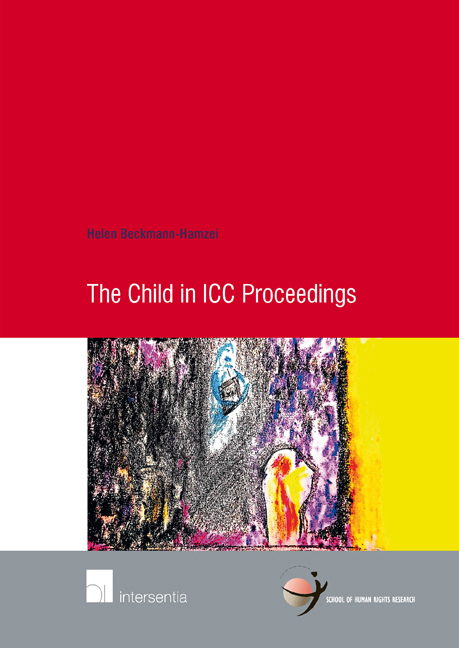Book contents
- Frontmatter
- Acknowledgments
- Contents
- List of Abbreviations
- Introduction
- Part I The Child in International Criminal Proceedings
- Chapter 2 The Child Witness
- Chapter 3 The Child Victim
- Chapter 4 The Child Perpetrator and the Child of a(n) (alleged) Perpetrator
- Part II The Child in International Reparation Practice
- Part III Concluding and Comparative Evaluation
- Summary
- Samenvatting
- Selected Bibliography
- Overview of Legislation
- Overview of Cases
- Curriculum Vitae
- Titles Published in the School of Human Rights Research Series
Chapter 3 - The Child Victim
from Part I - The Child in International Criminal Proceedings
Published online by Cambridge University Press: 12 December 2017
- Frontmatter
- Acknowledgments
- Contents
- List of Abbreviations
- Introduction
- Part I The Child in International Criminal Proceedings
- Chapter 2 The Child Witness
- Chapter 3 The Child Victim
- Chapter 4 The Child Perpetrator and the Child of a(n) (alleged) Perpetrator
- Part II The Child in International Reparation Practice
- Part III Concluding and Comparative Evaluation
- Summary
- Samenvatting
- Selected Bibliography
- Overview of Legislation
- Overview of Cases
- Curriculum Vitae
- Titles Published in the School of Human Rights Research Series
Summary
INTRODUCTION
With the establishment of the ICC, for the first time in the history of international criminal law, victims can participate in international criminal proceedings. The possibility of victim participation in criminal proceedings constitutes a novelty and special feature of ICC proceedings. Children may also participate as victims. The participation as victim in ICC proceedings is not limited to the course of the criminal proceedings. As child claimant, children may also participate in the reparation proceedings. This capacity is further explored in Chapter Five. Instead of being limited to the role of beneficiary of substantive protection, the participation in the proceedings as victim participant and/or claimant, empowers the child to pursue his or her personal interest – this presupposes, however, that the investigator started investigations in a particular situation and that victims can prove, amongst others, a causal link between the harm suffered and the charges. In contrast to the procedural capacity of the child witness, the involvement of the child in these capacities is, without disregarding the two aforementioned potential constraints, less determined by a prosecutorial or defence strategy.
The first case concerned the recruitment of children as war crime. Children are the direct victims of this crime. It is no surprise, therefore, that children participated as victims in this case. This opportunity constituted a tool which enabled the child to express his or her personal views and concerns on matters that affect him/her.
After a brief reflection on victim participation and an overview of actual child participation in ICC proceedings, this chapter examines three aspects of child participation in light of the first practice at the ICC: firstly, it examines the victim requirements as codified under the Rome Statute when applied to children; secondly, the chapter analyses constraints which may hinder children's effective access to the criminal proceedings; finally, it analyses to what extent the modalities of victim participation might require adjustment when children participate. Each of the forgoing aspects thereby analyses whether a distinct approach compared to adult participants is necessary when children participate in the course of the criminal proceedings.
- Type
- Chapter
- Information
- The Child in ICC Proceedings , pp. 79 - 136Publisher: IntersentiaPrint publication year: 2015



